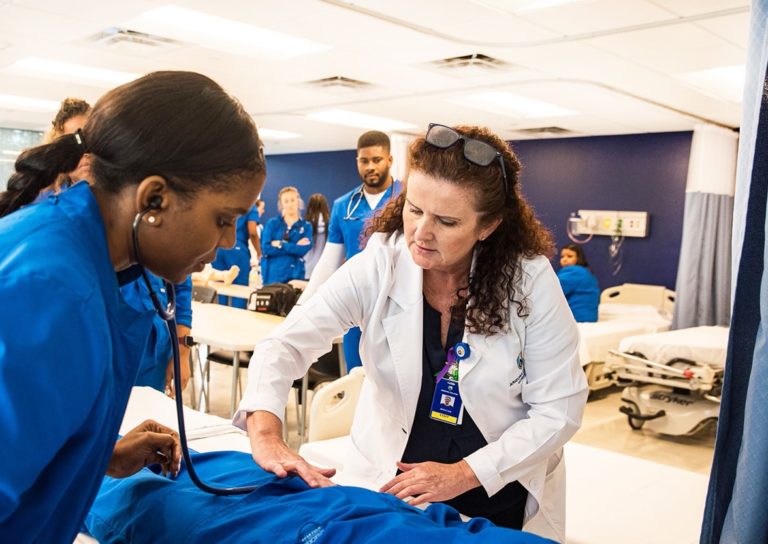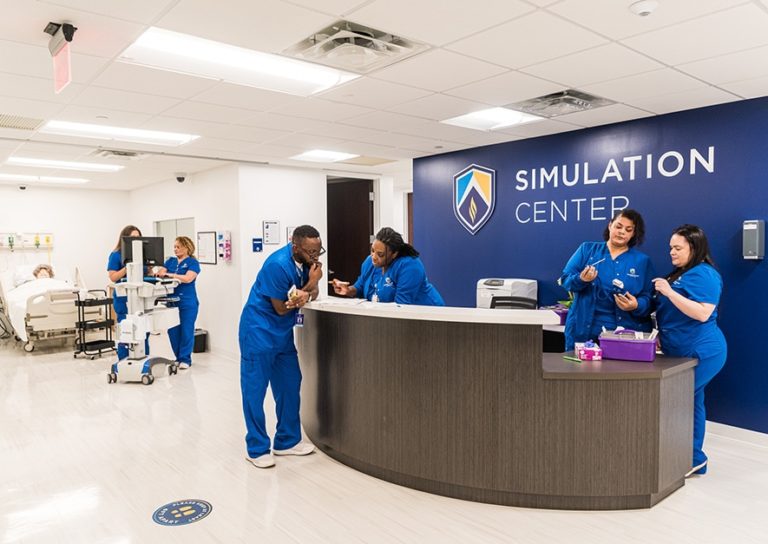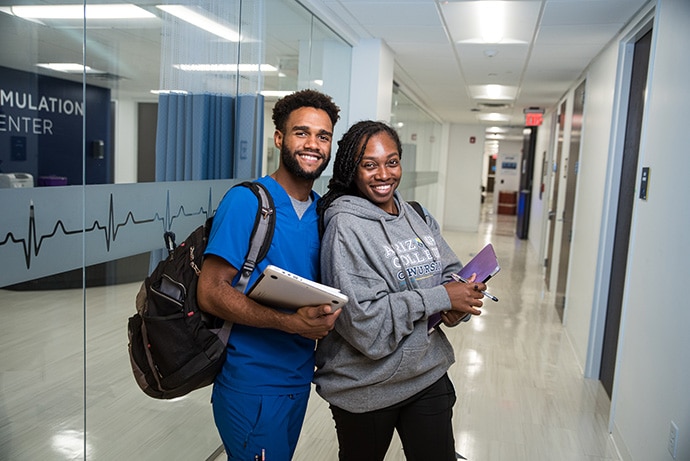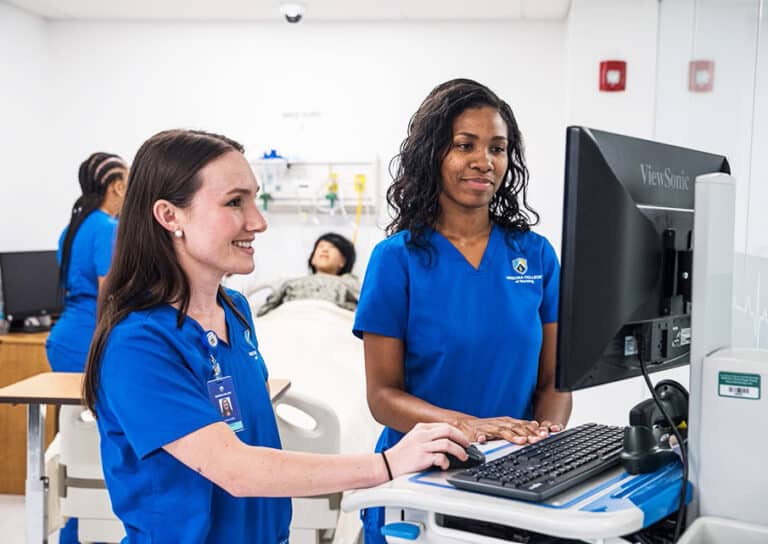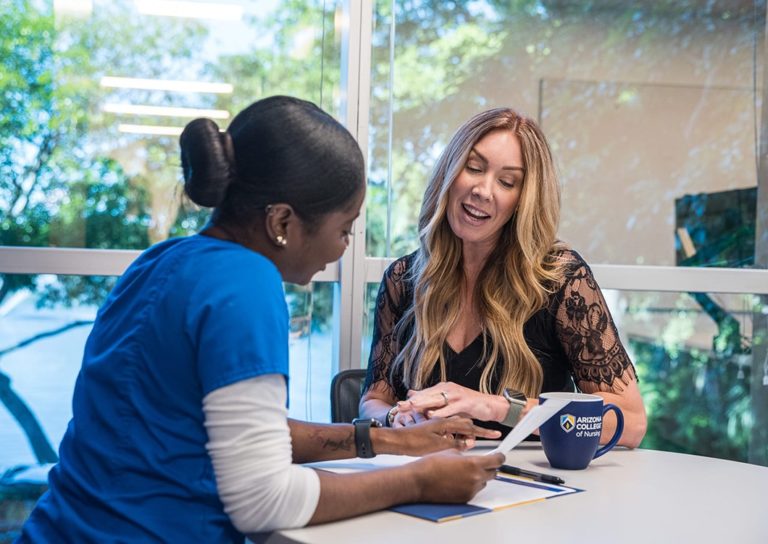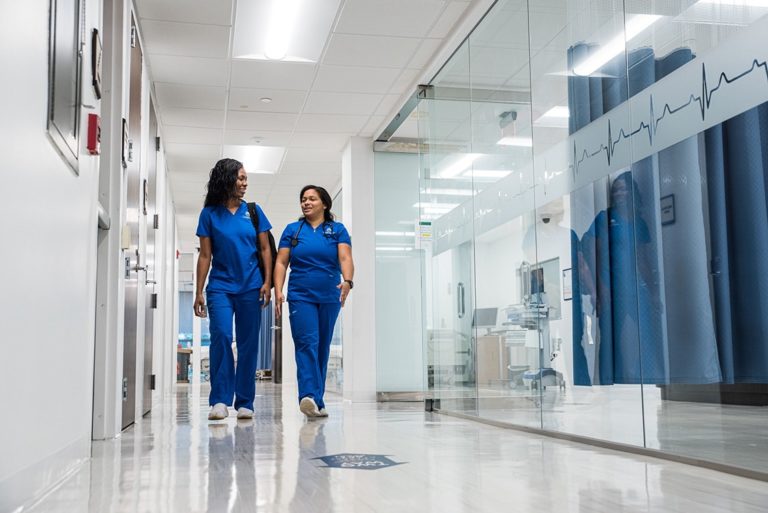
BSN Program – Schedule of Courses
The mission of the Arizona College of Nursing BSN degree program is to prepare professional nurses who are competent in delivering evidence-based patient- and community-centered care as members and leaders of an interprofessional health care team with an emphasis on quality improvement that drives desired patient, systems and population outcomes.
To view California only course exceptions, please visit our Academic Catalog.
Required General Education & Science Course Descriptions
The BSN degree program is divided into two parts: general education and core nursing. BSN nursing is grounded in a foundation of liberal arts and sciences. The program requires 50* credits hours of general education that prepare the student for the nursing curriculum and are designed to achieve the following outcomes:
- Communicating effectively: Communicate clearly and appropriately in writing with the ability to logically defend one’s position.
- Solving problems quantitatively: Analyze data quantitatively as the basis for making valid inferences in order to draw appropriate conclusions.
- Exploring the natural world: Apply principles of physical and biological science to interpret human-environment interaction.
- Understanding human behavior: Apply principles of biobehavioral science to interpret human behavior and social interaction.
- Including diverse perspectives: Value the inclusion of diversity in all social processes. • Engaging civically: Impact communities through advocacy.
* Colorado only: 47 Gen ed credit hours, 73 core credit hours. Colorado exceptions are found on pages 12-13 of our Academic Catalog.
General Education & Science: BIO 189
Fundamentals of Biology
3.0 Credit Hours
This foundational biology course is a survey of basic biological concepts, processes, structures and functions. The emphasis is on the relevance of fundamental biological principles to human biology and health. Prerequisites: None
General Education & Science: BIO 201
Natural Science – General: Human Anatomy/Physiology I (Lecture/Lab)
4.0 Credit Hours
The first of a two sequence course that focuses on the structure and function of the human body. The emphasis is on typical anatomical structures and human body system function and interaction. The course is organized by select human body systems. Prerequisites: BIO 189
General Education & Science: BIO 202
Natural Science – General: Human Anatomy/Physiology II (Lecture/Lab)
4.0 Credit Hours
The second of a two sequence course that focuses on the structure and function of the human body. The emphasis is on typical anatomical structures and human body system function and interaction. The course is organized by select human body systems. Prerequisites: BIO 189, BIO 201
General Education & Science: BIO 205
Natural Science – General: Microbiology (Lecture/Lab)
4.0 Credit Hours
This course focuses the interrelationship between biological organisms of the macroand microscopic worlds. The emphasis is on the impact of microorganisms on human health and function. Prerequisites: BIO 189
General Education & Science: CHM 130
Natural Science – Quantitative: Introductory Chemistry (Lecture/Lab)
4.0 Credit Hours
This foundational chemistry course is a survey of basic general organic and biochemistry concepts, processes and structures. The emphasis is on the relevance of fundamental chemistry principles to human health and functioning. Prerequisites: None
General Education & Science: ENG 101
First Year Composition I
3.0 Credit Hours
This course is an introduction to scholarly writing and research. It serves as the foundation of skills needed for appropriate academic and professional writing. The emphasis is on organization, formatting and source integration. Prerequisites : None
General Education & Science: ENG 102
First Year Composition II
3.0 Credit Hours
This course is an introduction to rhetoric in relation to academic and professional writing. It serves to foster critical thinking and argumentation skills. The emphasis is on source evaluation and argument structure. Prerequisites : ENG 101
General Education & Science: PSC 101*
Introduction to American Politics*
3.0 Credit Hours*
This course is an introduction to the political culture and behavior that shape American politics. The emphasis is on political concepts and processes and their policies and public governance. (Satisfies the legislative requirement for the United States and Nevada Constitutions.) Prerequisites : None
*Not applicable in Colorado
General Education & Science: HCR 230
Culture & Health/Humanities: Cultural Diversity & Global Health
3.0 Credit Hours
This course focuses on human diversity and its relevance to human health and functioning. Emphasis is on developing self-awareness of one’s own perspective on diversity including cultural influence and bias. Exploration of non-allopathic healing practices is included. Prerequisites : None
General Education & Science: HCR 240
Human Systems: Human Pathophysiology
4.0 Credit Hours
This course focuses on the biophysical aspects of human health alterations including disease, illness, injury and pathology. Emphasis is on abnormal function of human body systems and their interaction. Prerequisites : BIO 189, BIO 201, BIO 202
General Education & Science: MAT 151
Mathematical Studies: College Mathematics
3.0 Credit Hours
This foundational mathematics course focuses on mathematical skills, techniques and operations for problem solving in the health sciences. The emphasis is on dimensional analysis and solving for unknowns. The course includes financial and basic probability calculations. Prerequisites : None
General Education & Science: NTR 241
Human Systems: Human Nutrition
3.0 Credit Hours
This course focuses on the role of nutrition on human health and function. The course spans all levels of prevention. The emphasis is on health promotion and nutrition therapy. Prerequisites: CHM 130
General Education & Science: PSY 101
Social & Behavioral Sciences: Introduction to Psychology
3.0 Credit Hours
This foundational psychology course is a survey of basic mental concepts, principles and processes that impact human health and function. Emphasis is on the scientific study of human thought and behavior. Prerequisites : None
General Education & Science: PSY 230
Statistics/Quantitative Analysis: Statistics
3.0 Credit Hours
This course is an introduction to concepts in descriptive and inferential statistics with an application to psychology and the health sciences. The emphasis is on statistical methods and the ability to make valid inferences. The course includes use of contemporary information processing technology. Prerequisites : None
General Education & Science: PSY 240
Social & Behavioral Sciences: Human Development
3.0 Credit Hours
This course focuses on human development throughout the lifespan. The emphasis is on the physical, cognitive, social and emotional changes at each stage of life. The course includes sociocultural influences on growth and development. Prerequisites : None
Nursing Core Semester 5 Course Descriptions
Learning takes place in multiple environments including the classroom, clinical agencies, simulation and learning laboratories, the community and virtually through the internet. Courses may be offered residentially, online or in a blended format. The faculty at Arizona College of Nursing commit to teaching-learning practices that are evidence based, interactive and student centered. Learning is an active process facilitated by faculty. Students engage actively with faculty, peers and patients to promote learning and achieve competence for entry-level nursing practice. Faculty are readily available for extra support, tutoring and guidance. Students and their success are at the heart of everything faculty do.
Semester 5: NUR 211
Critical Thinking in Clinical Decision-Making
2.0 Credit Hours
This course focuses on the foundational knowledge and skills required to develop clinical judgment and decision making in order to provide safe and effective patient-centered care as a member of an interprofessional team. Emphasis is on the use of the nursing process as a model for delivering care. Prerequisites: Admission to Core Nursing Program
Semester 5: NUR 213
Ethics & Legal Standards in Nursing Practice I
1.0 Credit Hours
This is the first in a three-course sequence that focuses on the ethical, legal and professional standards, concepts and processes that guide and inform nursing practice. Emphasis is on the use of these various components in the processes of clinical judgment and evidence-based decision making in order to deliver patient- centered interprofessional care that achieves desired patient, systems and population outcomes. The course is organized by various professional and practice-relevant concepts. Prerequisites: Admission to Core Nursing Program
Semester 5: NUR 215
Theoretical Foundation in Nursing Practice
2.0 Credit Hours
This course focuses on the foundational knowledge and skills for professional nursing practice. Emphasis is on basic care processes for patient-centered interprofessional care that achieve desired patient outcomes in adults and older adults. Prerequisite: Admission to Core Nursing Program
Semester 5: NUR 215L
Theoretical Foundation in Nursing Practice Practicum
3.0 Credit Hours
This is a clinical practicum where basic nursing care processes are applied to adults and older adults in order to achieve desired patient outcomes. Course includes the training in and practice of select psychomotor skills in the laboratory setting. Prerequisites: Admission to Core Nursing Program
Semester 5: NUR 216
Health Assessment
3.0 Credit Hours
This course focuses on the gathering and evaluation of biopsychosocial data from adults and older adults to inform clinical judgment and make an evidence-based decision regarding priority actions. Emphasis is on physical assessment and health history taking. Course includes training in and practice of select health assessment skills in the laboratory setting. Prerequisites: Admission to Core Nursing Program
Semester 5: NUR 218
Interprofessional Communications
1.0 Credit Hours
This course focuses on the development of effective communication and collaboration skills that promote safe and high-quality patient-centered interprofessional care. Prerequisites: Admission to Core Nursing Program
Semester 5: NUR 338
Leader in Quality & Patient Safety I
1.0 Credit Hours
This is the first of a four-course sequence that focuses on the ability to participate in and lead practice initiatives that promote patient safety and improvement of the quality of interprofessional care. Emphasis is on the structures, processes, sociopolitical issues and human factors that affect patient safety and quality. Prerequisites: Admission to Core Nursing Program
Nursing Core Semester 6 Course Descriptions
The BSN degree program is supported by a variety of web-based education applications that support the development of critical thinking and clinical judgement. Such applications include virtual clinical scenarios, virtual laboratory simulations, interactive e-books, personalized learning platforms and video case studies.
Semester 6: NUR 333
Ethics & Legal Standards in Nursing Practice II
1.0 Credit Hours
This is the second in a three-course sequence that focuses on the ethical, legal and professional standards, concepts and processes that guide and inform nursing practice. Emphasis is on the use of these various components in the processes of clinical judgment and evidence-based decision making in order to deliver patient- centered interprofessional care that achieves desired patient, systems and population outcomes. The course is organized by various professional and practice-relevant concepts. Prerequisites: NUR 213
Semester 6: NUR 334
Pharmacology I
2.0 Credit Hours
This is the first of a two-course sequence that focuses on the role of professional nursing as a component of interprofessional patient-centered care in the application of pharmacotherapy to treat commonly occurring health problems and restore health. Emphasis is on the development of clinical judgment and evidence- based decision making to promote safe and effective medication administration and monitoring. The course is organized by various biological concepts. Prerequisites: NUR 211; NUR 213; NUR 215; NUR 215L; NUR 216; NUR 218; NUR 338
Semester 6: NUR 337
Evidence-Based Practice I
1.0 Credit Hours
This is the first of a four-course sequence that focuses on the ability to access, appraise and use the best available evidence in the process of making a decision as a member of an interprofessional team to achieve desired patient, systems and population outcomes. Prerequisites: NONE
Semester 6: NUR 355
Acute & Chronic Health Disruptions in Adults I
3.0 Credit Hours
This is the first of a three-course sequence that focuses on the provision of professional nursing care to adults and older adults as a critical component of patient-centered interprofessional care. Emphasis is on the development of clinical judgment and evidence-based decision making in order to achieve desired patient outcomes. The course is organized by specific biopsychosocial concepts that are applied across practice settings and levels of prevention. Prerequisites: NUR 211; NUR 213; NUR 215; NUR 215L; NUR 216; NUR 218; NUR 338
Semester 6: NUR 355L
Acute & Chronic Health Disruptions in Adults I Practicum
3.0 Credit Hours
This is a clinical practicum where professional patient-centered nursing care is delivered to adults and older adults as a member of an interprofessional team. Emphasis is on the development of clinical judgment and evidence-based decision making in order to achieve desired patient outcomes. Course includes training in and practice of select psychomotor skills in the laboratory setting. Prerequisites: NUR 211; NUR 213; NUR 215; NUR 215L; NUR 216; NUR 218; NUR 338
Semester 6: NUR 356
Mental Health Theory & Application
3.0 Credit Hours
This course focuses on the provision of professional nursing care as a critical component of patient- centered interprofessional care to individuals across the life span who are experiencing alterations in mental health. Emphasis is on the development of clinical judgment and evidence-based decision making in order to achieve desired patient and systems outcomes. The course is organized by specific biopsychosocial concepts that are applied across practice settings and levels of prevention. Prerequisites: NUR 211; NUR 213; NUR 215; NUR 215L; NUR 216; NUR 218; NUR 338
Semester 6: NUR 356L
Mental Health Theory & Application Practicum
2.0 / 3.0** Credit Hours
This is a clinical practicum where professional patient-centered nursing care is delivered as a member of an interprofessional team to individuals who are experiencing mental health alterations. Emphasis is on the development of clinical judgment and evidence-based decision making in order to achieve desired patient and systems outcomes. Course includes training in and practice of select psychomotor and therapeutic communication skills in the laboratory setting. Prerequisites: NUR 211; NUR 213; NUR 215; NUR 215L; NUR 216; NUR 218; NUR 338
** Colorado only. Colorado students have an additional 188 simulation clinical hours for a total of 765 clinical hours.
Nursing Core Semester 7 Course Descriptions
Campuses provide space optimized for student learning and engagement. Wi-Fi is available throughout. Classrooms are outfitted with computer-operated audiovisual equipment. A Learning Resource Center (LRC) is the campus hub of academic support including tutoring plus group and individual study space.
Semester 7: NUR 354
Pharmacology II
2.0 Credit Hours
This is the second of a two-course sequence that focuses on the role of professional nursing as a component of interprofessional patient-centered care in the application of pharmacotherapy to treat commonly occurring health problems and restore health. Emphasis is on the development of clinical judgment and evidence- based decision making to promote safe and effective medication administration and monitoring. The course is organized by various biological concepts. Prerequisites: NUR 333; NUR 334; NUR 337; NUR 355; NUR 355L; NUR 356; NUR 356L
Semester 7: NUR 357
Evidence-Based Practice II
1.0 Credit Hours
This is the second of a four-course sequence that focuses on the ability to access, appraise and use the best available evidence in the process of making a decision as a member of an interprofessional team to achieve desired patient, systems and population outcomes. Prerequisites: NUR 337
Semester 7: NUR 358
Leader in Quality Care & Patient Safety II
1.0 Credit Hours
This is the second of a four-course sequence that focuses on the ability to participate in and lead practice initiatives that promote patient safety and improvement of the quality of interprofessional care. Emphasis is on the structures, processes, sociopolitical issues and human factors that affect patient safety and quality. Prerequisites: NUR 338
Semester 7: NUR 425
Acute & Chronic Health Disruptions in Adults II
2.0 Credit Hours
This is the second of a three-course sequence that focuses on the provision of professional nursing care to adults and older adults as a critical component of patient-centered interprofessional care. Emphasis is on the development of clinical judgment and evidence-based decision making in order to achieve desired patient and systems outcomes. The course is organized by specific biopsychosocial concepts that are applied across practice settings and levels of prevention. Prerequisites: NUR 333; NUR 334; NUR 337; NUR 355; NUR 355L; NUR 356; NUR 356L
Semester 7: NUR 425L
Acute & Chronic Health Disruptions in Adults II Practicum
3.0 Credit Hours
This is a clinical practicum where professional patient-centered nursing care is delivered to adults and older adults as a member of an interprofessional team. Emphasis is on the development of clinical judgment and evidence-based decision making in order to achieve desired patient and systems outcomes. Course includes training in and practice of select psychomotor skills in the laboratory setting. Prerequisites: NUR 333; NUR 334; NUR 337; NUR 355; NUR 355L; NUR 356; NUR 356L
Semester 7: NUR 426
Community Health Nursing Theory & Application
3.0 Credit Hours
This course focuses on the application of professional nursing knowledge and skills as a critical component of community health. Emphasis is on the development of clinical judgment and evidence-based decision making in order to achieve desired population health outcomes. Further emphasis is on addressing social determinants of health as a member of an interprofessional team. The course is organized by specific biopsychosocial concepts that are applied in the community to the primary and secondary levels of prevention. Prerequisites: NUR 333; NUR 334; NUR 337; NUR 355; NUR 355L; NUR 356; NUR 356L
Semester 7: NUR 426L
Community Health Nursing Theory & Application Practicum
3.0 Credit Hours
This is a clinical practicum where professional nursing knowledge and skills are applied as a member of an interprofessional team in community practice settings. Emphasis is on the development of clinical judgment and evidence-based decision making in order to achieve desired population health outcomes and address social determinants of health. Course includes training in and practice of community assessment, surveillance and health promotion skills in the laboratory setting. Prerequisites: NUR 333; NUR 334; NUR 337; NUR 355; NUR 355L; NUR 356; NUR 356L
Nursing Core Semester 8 Course Descriptions
Semester 8: NUR 335
Maternal Health Theory & Application
3.0 Credit Hours
This course focuses on the provision of professional nursing care to women, their newborn and their families during the perinatal period as a critical component of patient-centered interprofessional care. Emphasis is on the development of clinical judgment and evidence-based decision making in order to achieve desired patient and family outcomes. The course is organized by both chronological events (pre-conception through newborn care) and biopsychosocial concepts that are relevant to the health, safety and adaptation of the family during the perinatal period. All levels of prevention and application across practice settings are included. Prerequisites: NUR 354; NUR 357; NUR 358; NUR 425; NUR 425L; NUR 426; NUR 426L
Semester 8: NUR 335L
Maternal Health Theory & Application Practicum
2.0 / 3.0** Credit Hours
This is a clinical practicum where professional patient-centered nursing care is delivered to women, their newborns and their families during the perinatal period as a member of an interprofessional team. Emphasis is on the development of clinical judgment and evidence-based decision making in order to achieve desired patient and family outcomes. Course includes training in and practice of select psychomotor and assessment skills in the laboratory setting. Prerequisites: NUR 354; NUR 357; NUR 358; NUR 425; NUR 425L; NUR 426; NUR 426L
**Colorado only. Colorado students have an additional 188 simulation clinical hours for a total of 765 clinical hours.
Semester 8: NUR 336
Pediatric Health Theory & Application
3.0 Credit Hours
This course focuses on the provision of professional nursing care to children and their families as a critical component of patient-centered interprofessional care. Emphasis is on the development of clinical judgment and evidence-based decision making in order to achieve desired patient and family outcomes. The course is organized by both life span development and biopsychosocial concepts that are relevant to children’s health, safety and wellness as well as family adaptation during a child’s alternation in health status. All levels of prevention and application across practice settings are included. Prerequisites: NUR 354; NUR 357; NUR 358; NUR 425; NUR 425L; NUR 426; NUR 426L
Semester 8: NUR 336L
Pediatric Health Theory & Application Practicum
2.0 / 3.0** Credit Hours
This is a clinical practicum where professional patient-centered nursing care is delivered to children and their families as a member of an interprofessional team. Emphasis is on the development of clinical judgment and evidence-based decision making in order to achieve desired patient and family outcomes. Course includes training in and practice of select psychomotor and assessment skills in the laboratory setting. Prerequisites: NUR 354; NUR 357; NUR 358; NUR 425; NUR 425L; NUR 426; NUR 426L
**Colorado only. Colorado students have an additional 188 simulation clinical hours for a total of 765 clinical hours.
Semester 8: NUR 423
Ethics & Legal Standards in Nursing Practice III
1.0 Credit Hours
This is the third in a three-course sequence that focuses on the ethical, legal and professional standards, concepts and processes that guide and inform nursing practice. Emphasis is on the use of these various components in the processes of clinical judgment and evidence-based decision making in order to deliver patient- centered interprofessional care that achieves desired patient, systems and population outcomes. The course is organized by various professional and practice-relevant concepts. Prerequisites: NUR 213; NUR 333
Semester 8: NUR 427
Evidence-Based Practice III
1.0 Credit Hours
This is the third of a four-course sequence that focuses on the ability to access, appraise and use the best available evidence in the process of making a decision as a member of an interprofessional team to achieve desired patient, systems and population outcomes. Prerequisites: NUR 337; NUR 357
Semester 8: NUR 428
Leader in Quality & Patient Safety III
1.0 Credit Hours
This is the third of a four-course sequence that focuses on the ability to participate in and lead practice initiatives that promote patient safety and improvement of the quality of interprofessional care. Emphasis is on the structures, processes, sociopolitical issues and human factors that affect patient safety and quality. Prerequisites: NUR 338; NUR 358
Nursing Core Semester 9 Course Descriptions
BSN-educated Registered Nurses (RNs) are health care professionals who provide and coordinate care for individuals, families, communities and populations. Their practice is based on nursing knowledge, theory and research as well as knowledge from a wide array of other fields and professions, adapting and applying this knowledge as appropriate to professional practice.
Semester 9: NUR 443
Transition to the Profession
1.0 Credit Hours
This course focuses on the development of reflective practice as a mechanism for professional nurses to identify gaps in professional and clinical competencies and develop lifelong learning plans. Prerequisites: NUR 335; NUR 335L; NUR 336; NUR 336L; NUR 423; NUR 427; NUR 428
Semester 9: NUR 445
Acute & Chronic Health Disruptions in Adults III
3.0 Credit Hours
This is the third of a three-course sequence that focuses on the provision of professional nursing care to adults and older adults as a critical component of patient-centered interprofessional care. Emphasis is on the development of clinical judgment and evidence-based decision making in order to achieve desired patient, systems and population outcomes. The course is organized by specific biopsychosocial concepts that are applied across practice settings and levels of prevention. Prerequisites: NUR 335; NUR 335L; NUR 336; NUR 336L; NUR 423; NUR 427; NUR 428
Semester 9: NUR 445L
Acute & Chronic Health Disruptions in Adults III Practicum
4.0 Credit Hours
This is a clinical practicum where professional patient-centered nursing care is delivered to adults and older adults as a member of an interprofessional team. Emphasis is on the development of clinical judgment and evidence-based decision making in order to achieve desired patient, systems and population outcomes. Course includes training in and practice of select psychomotor skills in the laboratory setting. Prerequisites: NUR 335; NUR 335L; NUR 336; NUR 336L; NUR 423; NUR 427; NUR 428
Semester 9: NUR 446
Professional Seminar
2.0 Credit Hours
This course focuses on readiness for professional nursing practice. Emphasis is on clinical judgment, evidence-based decision making and prioritization of assessments and actions in order to provide safe, effective and high-quality care as a member of an interprofessional team. Prerequisites: NUR 335; NUR 335L; NUR 336; NUR 336L; NUR 423; NUR 427; NUR 428
Semester 9: NUR 447
Evidence-Based Practice IV
1.0 Credit Hours
This is the fourth of a four-course sequence that focuses on the ability to access, appraise and use the best available evidence in the process of making a decision as a member of an interprofessional team to achieve desired patient, systems and population outcomes. Prerequisites: NUR 337; NUR 357; NUR 427
Semester 9: NUR 448
Leader in Quality Care & Patient Safety IV
3.0 Credit Hours
This is the fourth of a four-course sequence that focuses on the ability to participate in and lead practice initiatives that promote patient safety and improvement of the quality of interprofessional care. Emphasis is on the structures, processes, sociopolitical issues and human factors that affect patient safety and quality. Prerequisites: NUR 338; NUR 358; NUR 428


